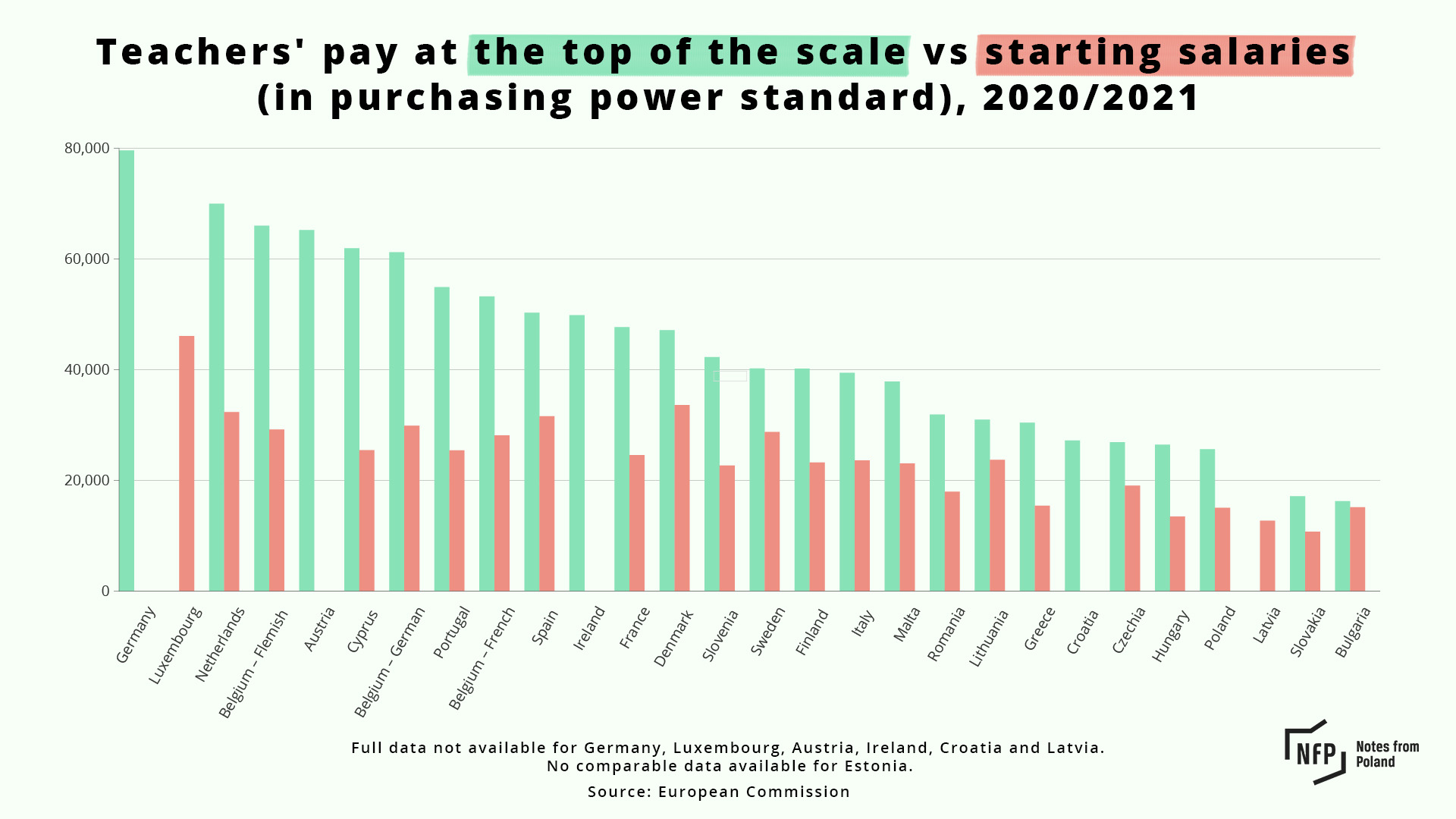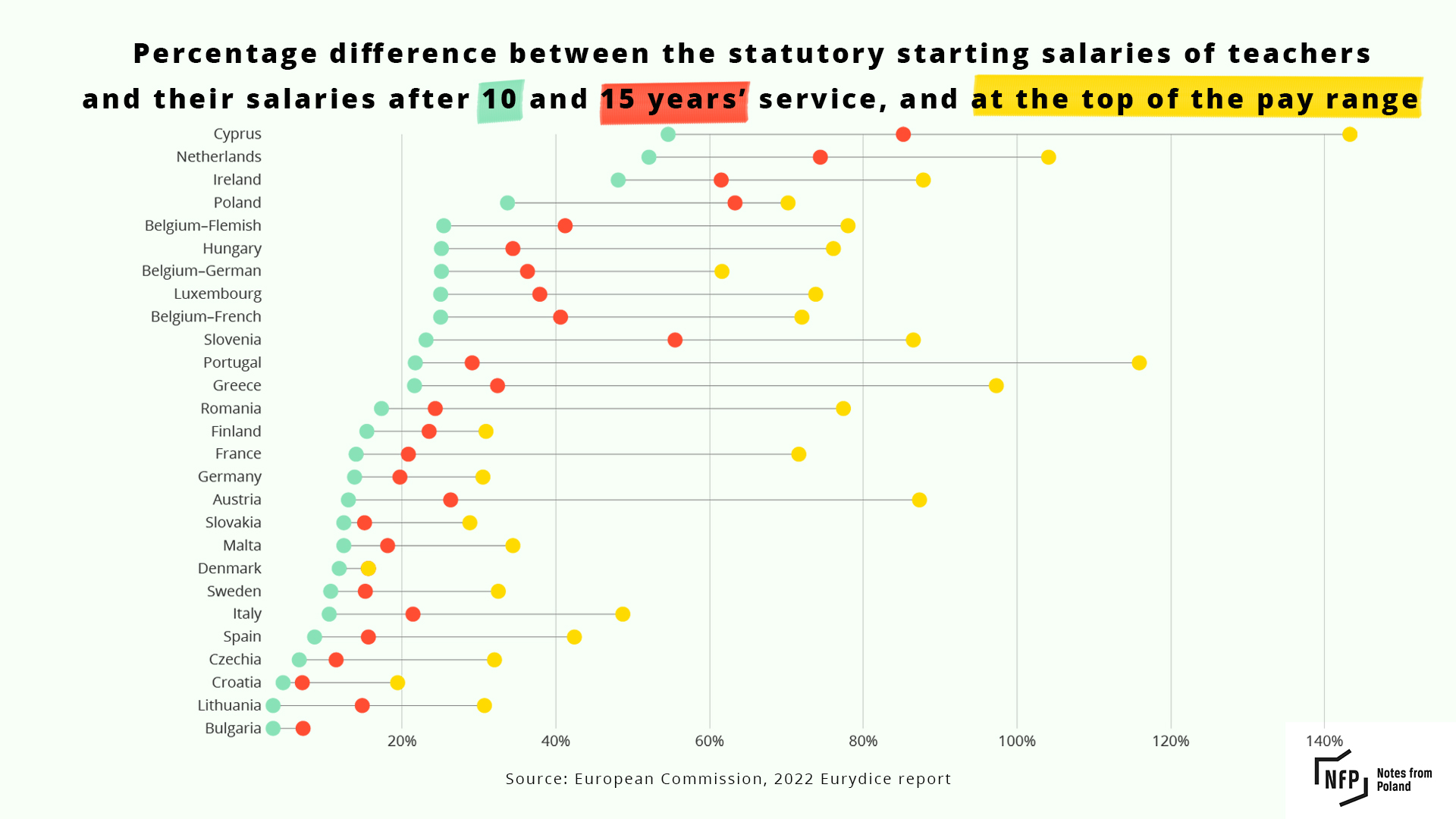Teachers in Poland are among the lowest paid in the European Union, even when taking into account the cost of living, new data show. Both starting salaries and those at the top of the pay scale are in the EU’s bottom four.
The main Polish teachers’ union is campaigning for a 20% pay rise, and has been organising protests. It argues that relatively low salaries are among the reasons that many teachers have been leaving the profession and that new recruits are hard to attract.
A new report from the European Commission compares teachers’ salaries across the continent based on purchasing power standard (PPS), an artificial common reference currency unit that eliminates price level differences between countries to facilitate international comparison.
It found that, in the 2020/2021 school year, Poland’s statutory starting salary for a teacher was the fourth lowest in PPS terms among the 22 EU states for which data was available. Top-end pay in Poland was the third lowest among the 23 countries with such data.

Source: Teachers’ and School Heads’ Salaries and Allowances in Europe – 2020/2021, European Commission
The report noted that, in absolute terms, the statutory starting salary for a teacher in Poland was 37,491 zloty (€8,311) a year, while pay at the top of the scale is 64,578 zloty (€14,146).
However, while Polish salaries are relatively low at all levels, the European Commission’s report noted that they do initially rise rapidly compared to other countries. In the first ten years of their career, Polish teachers employed full-time can see a 33.7% hike in salary, behind only Cyprus, the Netherlands and Ireland.
Further down the line, however, increases are slower, with Poland ranking 17th in the EU in terms of increases by the peak of a teacher’s earnings.
Polish teachers who reach the final of four career levels (trainee teacher, contract teacher, appointed teacher and chartered teacher) can count on a maximum increase of 70.2% compared to the starting salary and it takes them on average 20 years to reach this level.

Source: Teachers’ and School Heads’ Salaries and Allowances in Europe – 2020/2021, European Commission
Last Friday, Poland’s main teachers’ union, the ZNP, launched a temporary “protest town” outside the education ministry, where teachers plan to hold debates and demonstrations throughout this week.
They are demanding pay increases of 20% backdated to 1 September for all educators followed by salary increases from 1 January 2023 of at least five percentage points above inflation.
The government has already increased teachers’ salaries twice this year: in May by 4.4% and in September by 20%, but only for entry-level teachers.
In 2023, salaries for all teachers are expected to increase by 7.8%, similarly to the entire public sector. Trade unionists point out, however, that such increases do not compensate for the impact of inflation, which is at a 25-year high.
Poland's annual inflation rate rose to 17.2% this month, according to the flash estimate from state statistics agency @GUS_STAT.
That marks another 25-year high and is well above the median forecast of 16.5% pic.twitter.com/cB9moSOmUI
— Notes from Poland 🇵🇱 (@notesfrompoland) September 30, 2022
Other demands include limiting the number of students in a class to 20, free textbooks and provision of equipment for teachers’ workplaces.
Last month, as a part of its protest campaign, the ZNP urged teachers to give up the use of their own resources such as computers and phones for a week to make people aware of how much they invest in their own workplace.
Education minister Przemysław Czarnek has rejected the teachers’ demands, calling the protests “a political stunt performed by the ZNP”. However, yesterday he told Polsat News that would meet with the union’s head, Sławomir Broniarz, in the next “dozen or so days”.
Main photo credit: Piotr Skornicki /Agencja Gazeta

Alicja Ptak is deputy editor-in-chief of Notes from Poland and a multimedia journalist. She has written for Clean Energy Wire and The Times, and she hosts her own podcast, The Warsaw Wire, on Poland’s economy and energy sector. She previously worked for Reuters.




















